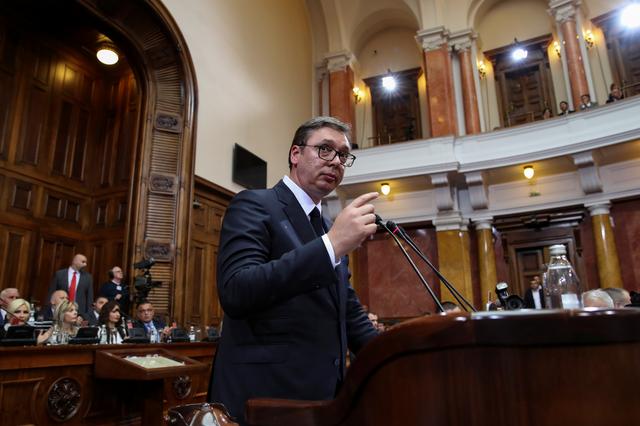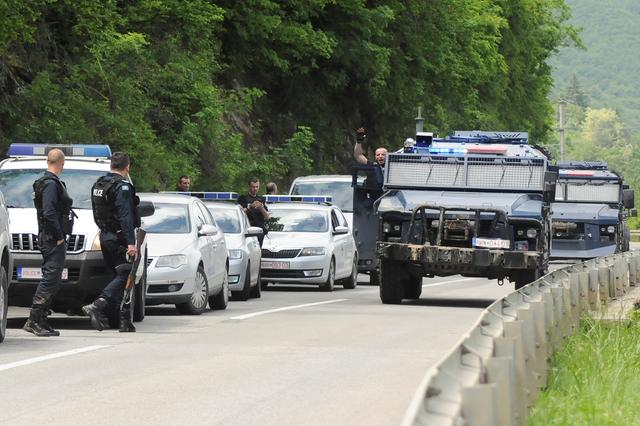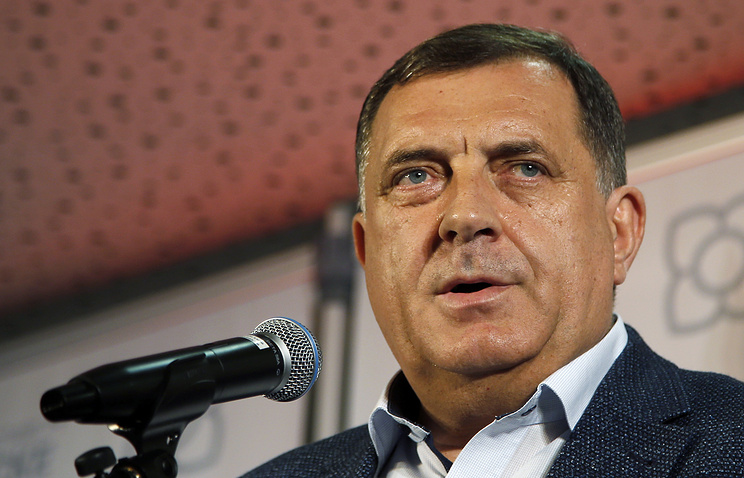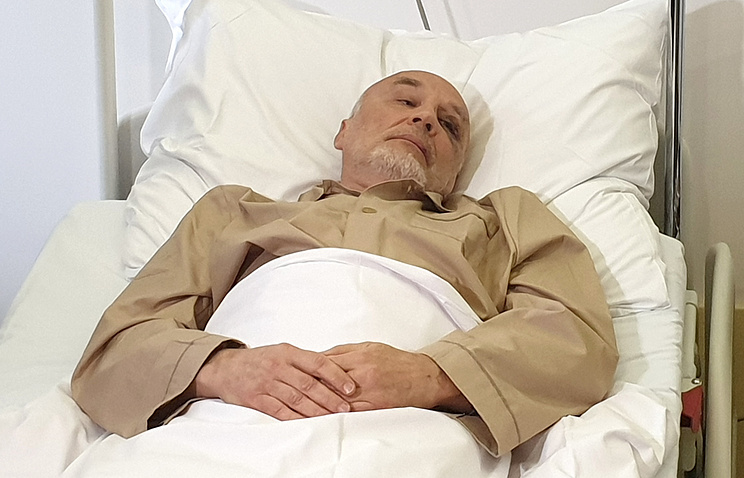Serbia needs to accept that it has lost control over Kosovo, its former southern province, and it must seek a compromise to normalize ties with Pristina, President Aleksandar Vucic told parliament in unusually blunt terms on Monday.
Accept reality, Serbia does not control Kosovo: Vucic

Serbia's President Aleksandar Vucic speaks in the Serbian Parliament in Belgrade, Serbia, May 27, 2019. REUTERS/Marko Djurica
Majority-Albanian Kosovo declared independence in 2008, almost a decade after NATO air strikes wrested control of the territory away from Belgrade, ending a brutal counter-insurgency by Serbian security forces.
But Serbia, which under its Constitution considers Kosovo an integral part of its territory, has been blocking Kosovo from membership of International institutions including Interpol and UNESCO. It also still provides financial aid to Serbs in Kosovo.
For years, Kosovo’s independence has been a taboo topic in Serbia because
most Serbs regard it (Kosovo) as the cradle of their nation and of the Orthodox Christian faith.
But Vucic spoke plainly on Monday.
“We need to recognize that we have been defeated.. We lost the territory,” Vucic told parliament during a special session dedicated to Kosovo. “I did not opt to continue with lies and deceit. I have told everyone: There is no Serbian (visible) authority in Kosovo except in hospitals and schools,” he said.
Serbia and Kosovo agreed to an EU-sponsored dialogue in 2013 to resolve all outstanding issues between them, which was key for both countries to progress towards membership in the European Union. But little progress has been achieved since then.
Their talks became deadlocked last November when Pristina introduced a 100% tax on all goods imported from Serbia. That move is expected to curb economic growth in Serbia slightly, as its exports to Kosovo amount to 500 million euros a year. Nevertheless, the IMF expects Serbia’s economy to grow 3.5% this year.
" We have two options - to normalize relations by reaching an agreement or to maintain a frozen conflict," Vucic told the deputies, mostly members of the ruling coalition controlled by his Progressive Party.
Vucic is attempting a balancing act, maintaining both Serbia’s EU aspirations and its close ties with Russia and China, neither of whom recognize Kosovo. Five EU member states have also not recognized its independence.
However, he said it could take years before an agreement with Kosovo is achieved. He said Serbia would wait for Pristina to remove the 100% tax and then seek a compromise. Any solution will also require a referendum in Serbia.
“We will ask people to say what they think about a possible compromise solution in a referendum,” Vucic said.
Most opposition parties boycotted the session in parliament, in protest at what they call Vucic’s autocratic rule. They accuse him of stifling media freedoms and turning a blind eye to high-level corruption. Vucic denies these allegations.
Gordana Comic, a deputy for the opposition Democratic Party, said Vucic was merely trying to sound like some sort of agreement with Kosovo might be possible soon to please the EU. “This is the creation of atmosphere for announcing a ‘legally binding agreement’ (with Kosovo) in a few months ... ahead of the formation of the new European Commission,” Comic said.
Slideshow (3 Images)
Accept reality, Serbia does not control Kosovo: Vucic
Serbia places forces on alert after Kosovo police operation in Serb-populated north

Kosovo police secure the area near the town of Zubin Potok, Kosovo, May 28, 2019. REUTERS/Laura Hasani
BELGRADE/PRISTINA May 28, 2019 - Serbia ordered its troops on full alert on Tuesday and Russia accused Kosovo of provocation after a Kosovan police anti-crime operation in a region populated mainly by Serbs led to clashes.
At least 19 people were arrested and a Russian U.N. Official detained in the operation. Five police and six Serb civilians were wounded in fighting, Kosovan Official said.
The incidents signaled rising tensions in four Serb-majority municipalities in northern Kosovo, parts of which remain largely outside control of Pristina and pledge allegiance to Belgrade. The United Nations peacekeeping mission in Kosovo appealed for calm.
Belgrade said it viewed the Kosovan police operation as an attempt by Pristina to take control of northern parts of Kosovo which border Serbia.
Serbian President Aleksandar Vucic told parliament that Belgrade would try to “preserve peace and stability” but remained ready to react. “As the supreme commander, I have placed our army units in full combat readiness, if there is any serious endangering of order and people in the northern Kosovo, they will protect our people,” he told deputies.
Kosovan Foreign Minister Behgjet Pacolli said the operation had been carried out against criminal groups in northern Kosovo, where cross-border smuggling is rampant.
“It was normal work of our police and I believe it’s not the last operation in Kosovo. Maybe today or the next days we will keep fighting the organized crime,” Pacoli told reporters in the Slovak capital Bratislava.
In Pristina, police chief Rashit Qalaj said a total of 19 Kosovan police officers had been arrested on suspicion of smuggling goods into the country. Eleven were ethnic Serbs, four ethnic Albanians and four were Bosniaks, he told a news conference.
Law enforcement officers had faced “armed resistance”, Qalaj said. Five policemen were wounded, one from a gunshot. Six Serb civilians were also hurt, he said.
Majority-Albanian Kosovo declared independence in 2008, almost a decade after NATO air strikes wrested control of the territory away from Belgrade to end a counter-insurgency campaign by Serbian security forces.
But Serbia, which under its constitution considers Kosovo an integral part of its territory, has been blocking Kosovo from membership of international institutions including Interpol and UNESCO. It also still provides financial aid to Serbs in Kosovo.
RUSSIAN DETAINED
Two United Nations employees, one of them Russian, were also detained in the Kosovo police operation. Both were later released after demands from the U.N. mission - known as UNMIK - and the Kremlin. They were taken to hospital for treatment.
Qalaj said the Russian and a local staffer had been detained for joining a barricade. UNMIK was following the developments in northern Kosovo with great concern, U.N. mission chief Zahir Tanin said in a statement. “I urge all parties to abide by the principles of rule of law and dignity for all to life and liberty, and to help restore calm and security in the area,” he said.
Moscow, a close ally of Serbia, had wasted no time in demanding the immediate release of the Russian and criticizing the Kosovan government. “We consider the incursion of the Kosovo-Albanian special forces into the region’s north...as yet another provocation from Pristina aimed at intimidating and squeezing out the non-Albanian population and establishing control over these areas by force,” the Russian foreign ministry said in a statement.
The NATO peacekeeping force in Kosovo (KFOR) said it was ready to intervene if necessary and also appealed for calm. “Because of the political sensitivity of the moment...KFOR invites all the parties to deal with the disputes peacefully and responsibly, without any use of force or violence,” NATO said.
A day earlier, Serbia’s Vucic had said Serbia had lost control over Kosovo and called for a compromise solution between Belgrade and Pristina to end the stalemated conflict.
Slideshow (5 Images)
Serbia places forces on alert after Kosovo police operation in...
Unrecognized Kosovo’s police detain 28 in territory’s north, says President Vucic
The Serbian leader added that
all nine civilians were detained in the village of Zubin-Potok for "resisting gunmen with bare hands".
Police in unrecognized Kosovo intruded into the north of the autonomous Serbian territory to detain 28 people, Serbia’s President Aleksandar Vucic told parliament on Tuesday.
"A total of 28 people were detained: 19 police and nine civilians. Of the 19 police eleven are Serbs, seven are Albanians and one Bosnian," Vucic said.
He added that all civilians were detained in the village of Zubin-Potok for "resisting gunmen with bare hands."
Unrecognized Kosovo’s crack police on Tuesday morning intruded into northern municipalities of Kosovo and Metohija. Two Serbs were slightly injured in shootouts. Vucic in a message to parliament said that Kosovo’s police had detained 23 people, including one Russian,
Mikhail Krasnoshchekov, a staffer of the United Nations Interim Administration Mission in Kosovo (UNMIK). Vucic said that at the moment of detention the Russian was beaten up. UNMIK said later the Russian had been released.
Russia demands Kosovo release detained Russian U.N. worker: RIA
Russia's embassy in Serbia on Tuesday demanded that Kosovo immediately release a detained Russian national working at a United Nations mission in Kosovo, the RIA news agency reported.
Kosovo releases Russian U.N. worker detained by police
Kosovo released a Russian national working for the United Nations on Tuesday, the United Nations mission in Kosovo said, after Moscow demanded that Pristina release him.
Russian detained in Kosovo has been set free, UN Secretariat confirms
© EPA-EFE/STRINGER
Mikhail Krasnoshchekov has reportedly been beaten up at the moment of detention.
Russian national Mikhail Krasnoshchekov, a member of the UN Interim Administration Mission in Kosovo UNMIK, has been released, the UN Secretary General’s deputy spokesman Farhan Haq told TASS on Tuesday. "It has been confirmed that the Russian staff member has been released," he said.
Special police units of unrecognized Kosovo on Tuesday morning intruded into northern municipalities of Kosovo and Metohija. Two Serbs were slightly injured in shootouts. Serbia’s President Aleksandar Vucic in a message to legislators said that Kosovo’s police had detained 23 people, including Russia’s Mikhail Krasnoshchekov, a staffer of the UN mission in Kosovo. Vucic said that at the moment of detention the Russian was beaten up.
According to the UN mission Krasnoshchekov is now in hospital.
The Russian embassy in Serbia strongly condemned the intrusion of Kosovo’s forces into the north of Kosovo and Metohija and demanded Krasnoshchekov’s immediate release.
Russia accuses Kosovo of 'provocation' over Serb detentions
Russia's Ministry of Foreign Affairs on Tuesday accused Kosovo of provocation
after its police detained what Moscow said were 13 Serbians in Serb-populated municipalities in Kosovo's north.
Serbia’s aircraft, armor seen moving southwards, accordong to media reports
The Tanjug news agency reported at least one MiG-29 fighter plane flew over Novi Pazar towards the Ground Safety Zone between Serbia and Kosovo.
BELGRADE, May 28, 2019 - Serbia’s aircraft and armor have been noticed on the way to the south of the country towards unrecognized Kosovo, the Tanjug news agency said on Tuesday.
A convoy of military vehicles and personnel left the barracks in Kraljevo, Central Serbia. The agency says it is most probably moving towards Raska (a city on the border with the autonomous province of Kosovo and Metohija - TASS). Defense Minister Aleksandar Vulin visited the barracks shortly before the departure.
Tanjug reports at least one MiG-29 fighter plane flew over Novi Pazar (in the country’s south) towards the Ground Safety Zone, established under the June 9, 1999 agreement concluded in Kumanovo. The zone is a five-kilometer-wide strip of land along the 382-kilometer border between the autonomous Serbian territory of Kosovo and Metohija and Central Serbia.
Earlier, Serbia’s President Aleksandar Vucic alerted the army following an aggravation of the situation in the Serbian autonomous province.
Kosovo remains source of instability in Balkans, Republika Srpska president says
According to Zeljka Cvijanovic,
Kosovo police raids were "a forceful political action" aimed at intimidating the region's Serb population.
The unrecognized Kosovo remains a constant source of instability in the Balkans region, Zeljka Cvijanovic, the President of Bosnia and Herzegovina’s Republika Srpska, said on Tuesday, commenting on the rising tensions in Kosovo.
"The unrecognized Kosovo undoubtedly is a serious source of instability in the Western Balkans, it is a territory where human rights and the rights of a nation are being violated and a territory that operates beyond the political and economic rules of the civilized world. It remains like this with the support of a part of the international community," she said.
According to Cvijanovic, Kosovo police raids were "a forceful political action" aimed at intimidating the region’s Serb population.
Kosovo’s PM promises to study case of Russian’s detention under international law
Prime Minister of unrecognized Kosovo Ramush Haradinaj promised to study the case of the detention of a member of the United Nations Interim Administration Mission in Kosovo (UNMIK), Russian national Mikhail Krasnoshchyokov, in compliance with international conventions. He also stated that Russia is involved in the destabilization of the situation in the region, he wrote on Twitter on Tuesday.
"Kosovo institutions will treat the case of the Russian ‘diplomat’ in accordance with international conventions. Kosovo and regional countries are familiar with the Russian agenda to destabilize our region," he wrote.
President of unrecognized Kosovo Hashim Thaci earlier explained UN Mission employee Krasnoshchyokov’s detention by the fact that he allegedly "tried to hamper the police action."
Kosovar authorities striving to kick Serbs out of Kosovo and Metohija — BiH Presidency
Chairman of the Presidency of Bosnia and Herzegovina Milorad Dodik © AP Photo/Darko Vojinovic
Chairman of the Presidency Milorad Dodik said taht this is a fight against the Serbs’ staying in Kosovo and Metohija
and an "attempt to instigate a new exodus".
The special forces’ operation of the Kosovar police in the north of Kosovo is aimed at driving Serbs away from the autonomous province, Chairman of the Presidency of Bosnia and Herzegovina Milorad Dodik said on Tuesday.
"It is clear that it is not an event in the fight against crime. This is a fight against the Serbs’ staying in Kosovo and Metohija and an attempt to instigate a new exodus," the politician said.










